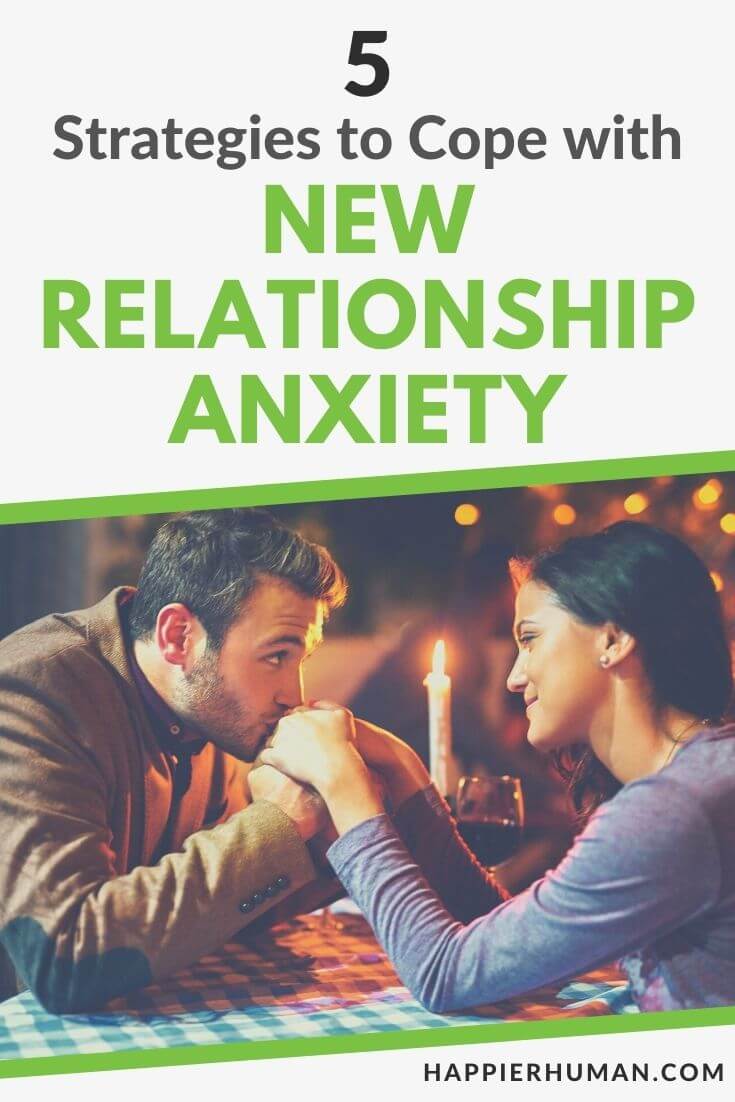There might be affiliate links on this page, which means we get a small commission of anything you buy. As an Amazon Associate we earn from qualifying purchases. Please do your own research before making any online purchase.
A relationship is one of the most beautiful and gratifying things in life, but it can often be challenging to navigate… especially if it’s a new relationship. These relationships can bring on a lot of insecurities, excitement and unfamiliar emotions – all of which can result in some confusion or hesitation at times.
Many people will chalk these intense emotions up to “butterflies” or nerves, but what if it’s more than that? What if it’s new relationship anxiety? In this article, we’ll address some of the most common insecurities and signs of new relationship anxiety, as way as offer tips to better cope with it.
What Is Anxiety?
Anxiety is a feeling of worry or unease about something with an uncertain outcome. It is often a constant, exaggerated feeling of apprehension that is the key symptom of an anxiety disorder. It is often a natural stress response, but when anxiety interferes with your ability to live the life you want, it's time to learn how to manage it.
Anxiety is an emotion that can be triggered by several factors and comes in various intensities – from mild to severe. All of us experience anxiety; it's just a part of life. Some people experience it when performing in front of a crowd, while others feel it at social gatherings… even when they aren’t at the center of attention.
Anxiety can often be a tough thing to deal with. It can be crippling and cause a lot of people to withdraw from their lives and isolate themselves. As an introvert, I have had my fair share of problems with anxiety. I've struggled with it for years. I've realized that much of the power I've given over to anxiety lies in uncertainty and the unknown about the future – or worries about decisions in the past that I can’t change.
Self-care is one of the essential tools in a person's arsenal when dealing with anxiety because it helps to ground you and bring you back to reality. It is a way to help yourself feel better and to help you feel better about yourself. This is not a one-and-done task. It is a process, and it will continually evolve.
You might find that you can do some specific things that help you feel better. These might be things like exercise, talking to someone you trust, or even something as simple as taking a hot bath. Whatever it is, your job is to find out what it is and keep doing it— keeping yourself grounded.
What Is New Relationship Anxiety, and is it Normal?
New relationship anxiety describes the intense feelings of stress, fear, and worry that people feel when they begin a new romantic or friendly relationship. It's a normal part of any new relationship, but it's important to recognize when it's negatively affecting your life. A lot of new relationship anxiety is caused by the fact that the relationship is still new and exciting, but also uncertain.

When you begin a new relationship, you enter into a whole new dynamic that you are not familiar with. You may be wondering if this will work out, or if you will get too attached too quickly. Or you may have thoughts about whether you chose the right partner or friend, and so on. These thoughts can be pretty scary and cause a lot of stress. But new relationship anxiety is a natural part of the life stages of a relationship, and it shouldn't be crippling or strip away the joy and euphoria of new beginnings.
New Relationship Anxiety: Signs You May Be Experiencing It
Meeting someone and forming new relationships can be a whirlwind experience! While this can be a thrilling time, it's okay to feel some pangs of concern over whether or not this relationship will last. At times, it's normal to have questions or worries about your new love connection, and it's perfectly natural to wonder where things are headed or if your partner or friend will truly understand and support you. However, if these thoughts start to seep into other areas of your life, you’ll want to do something about it.
Here are some signs of new relationship anxiety:
You are depriving yourself of fun.
Sometimes a relationship can seem to be going well, but you constantly worry about it or overanalyze it. When that happens, take that as a sign that you might have some lingering insecurities about the partnership.
Refusing to accept your significant other's affection.
Perhaps your partner or friend always seems to be glad to meet you and do kind things like bring you lunch or walk you home. But you can’t help but think to yourself, “They don't truly like me.”
Inferring too much from what they say and do.
New relationship anxiety is something that causes you to overthink everything your sweetie or pal does or says. Perhaps they don’t like to hold hands or hug. Though this may appear to be a red flag, it's more likely that your partner or friend is just a “germophobe”.
Fearing the end of the relationship.
It is almost impossible to feel secure in a relationship if your feelings constantly change. The perfect storm is created by fearing the worst and not being able to explain why you believe that way. When you worry about whether your partner or friend will leave you, it puts them on the defensive, which drives a wedge between the two of you and can eventually lead to sabotaging behavior on your part.
Sabotaging.
New relationship anxiety may be a source of self-sabotage. Some examples of ways in which you might be sabotaging a new relationship out of anxiety would be when you’re upset and claim that everything is fine without confronting the problem at hand. Or when you force yourself to push your partner or friend away, when they show concern by telling them that there’s nothing wrong (even if deep down inside your gut tells you otherwise).
Doubting compatibility in the long run.
Even when things are going well in a relationship, worrying about a relationship might make you wonder whether you and your partner or friend are compatible. You may also wonder whether you're truly happy or simply pretending to be. As a result, you may begin to overemphasize distinctions that aren't significant, such as their love of jazz and your preference for indie pop.
5 Strategies to Cope with New Relationship Anxiety
Here are five ways you can manage new relationship anxiety and minimize worries about if it will end or if you are suitable for each other:
1. You should ask yourself, “Does my relationship with this individual help me become more or less of who I am?”
Our relationships last longer when we can be ourselves and do what we want to do. So be sure that your partner or friend lets you grow freely as you need to, rather than holding you back from anything. Think about what makes you you. Then ask yourself if your partner or friend supports that part of who you are. If they do, that’s great!
Your relationship has a chance of lasting and fulfilling for both of you. In short, make sure that the person you end up with is someone who helps make you an even better version of yourself!
2. Be mindful and stay present.
Controlling my anxiety used to be one of my biggest challenges. I would find myself getting worked up over trivial issues that didn't warrant concern throughout my day. One way I avoid getting anxious and stressed about something is by checking if the scary thoughts in my head were based on facts or just imaginary.
Most of the time, my worries would be frivolous, like fighting a wild boar with a wooden sword. When this happens, I remind myself why it isn't worth stressing over those thoughts and focus instead on what would be more useful until they are mostly all gone. I usually start to feel a lot better a lot sooner that way.
So, check-in on whether you’re using “What if?” or “What is?” thinking. Thinking about “what if” scenarios usually cause worry. A fear-based, imagined location is placed in your mind, and you cannot escape. Your issue (and your fear) may be seen for what it is by using “what is” thinking (Read: What is happening around me? What is reality vs. what is all made up in my mind?)
3. Keep the things you love about them at the forefront.
If you lack fulfillment in your current relationship, this advice will be a boon to your well-being. To help with the anxiety that comes with deciding whether or not to end a relationship, it's helpful to keep reminders of all the good things that have happened handy. This is similar to what I tell people in on-again-off-again relationships who should keep a list of things they dislike about their ex in a convenient place (because it's impossible for anyone, romantic or otherwise, to be all sunshine and rainbows all the time).

Perhaps she is a frequent source of delight in the workplace. Or, maybe he doesn't care how much time you spend on Facebook. For example, they might concoct a delicious dish using unusual ingredients! Keep a few notes posted around the house to serve as gentle nudges when your significant other does something to make you think, “Hey, maybe this isn't so bad after all.”
4. See if anybody you know has any validating thoughts.
Having your closest friends and family around sometimes while you spend time with your partner or friend might help others see what you see in your relationship. Your loved one might report to you, “Are you kidding me?! You two are really cute, and you can tell you respect each other.” Or, “They're a deadbeat. They were nasty and disrespectful to you.”
Whether positive or negative, either way, you'll have good feedback. Depending on how many people you want to expose your new relationship to, you could see if you could get a consensus from at least one or two additional people. Hopefully, they will offer a more consistent feedback tone, as this may indicate that others are observing similar issues. If everybody is pretty much saying the same thing, then it’s probably time to take a look in the mirror and decide whether the relationship is worth hanging on to.
5. Separate “sabotaging fear” from “guidance anxiety.”
Guide anxiety is that feeling in your belly that wakes you up in the middle of the night. It’s annoying, and sometimes it even feels like a hindrance. But guidance anxiety doesn’t just happen randomly. It has a real purpose. When we ignore this sensation, we often regret our decisions to push them away because deep inside, we know what is best for us.
Perceived “incompatibility” typically manifests in all types of relationships, including friendships, romantic partnerships, and familial ones. While your mind may have become convinced that there is a “problem” with the other person, be aware that it could merely be sabotaging fear rearing its pesky head. Perhaps there is no real reason to have these concerns about your partner or friend. Honestly, if you were truly incompatible, the anxiety wouldn't feel so insurmountable. The most important thing is to know when enough is enough. As I said before, whenever you need to, find someone who will help you get a bit of perspective on where things stand in your relationship!
Final Thoughts on New Relationship Anxiety
There is generally great excitement that comes with falling in love and being in a new relationship. Still, it’s not always easy to get close to someone new.
New relationship anxiety is common and, at lower intensities, natural. There are so many reasons why this kind of anxiety can be triggered, but the key to overcoming it is recognizing its signs and crippling it before it cripples you.
I hope this article has been able to shed some light on things for you. If you want to learn more about overcoming anxiety, or staying present, check out our article on how to experience less stress. Find beauty in the unknown because one of the best parts of new relationships is discovering more about the person you’re with.


